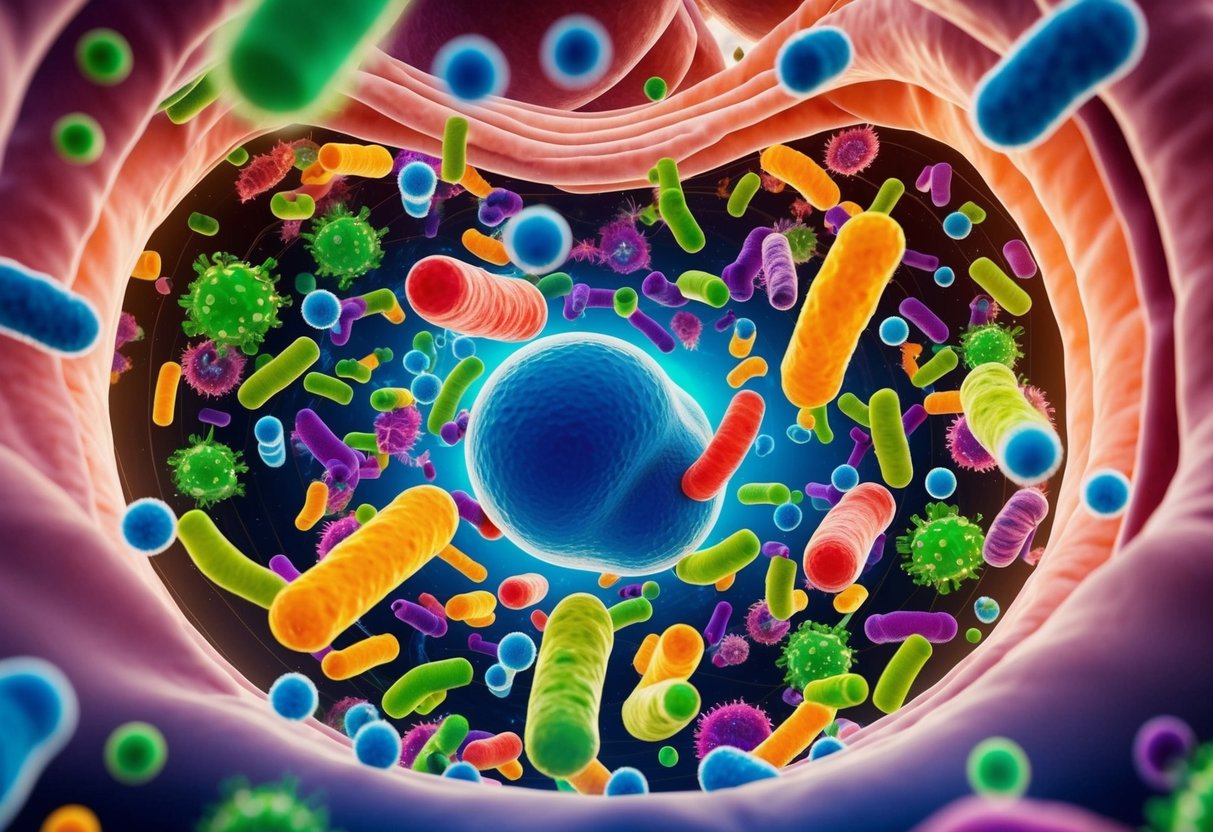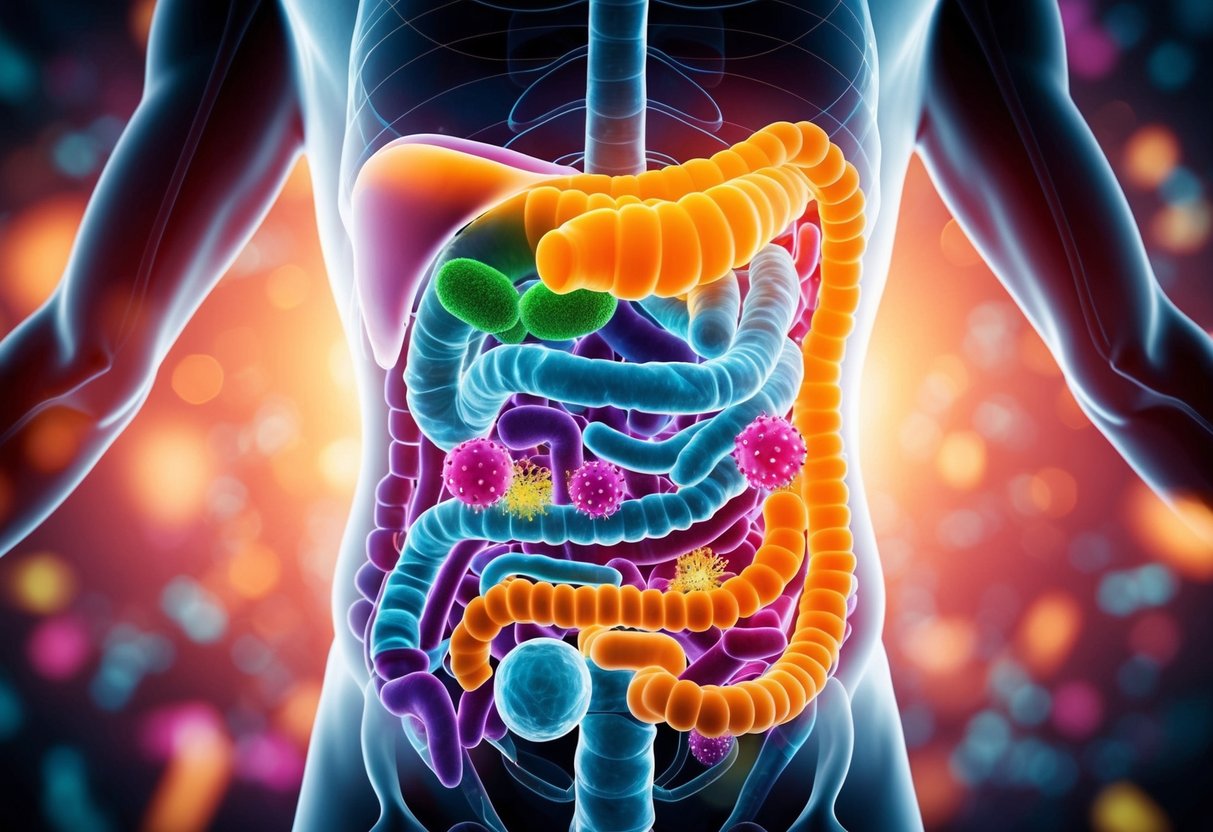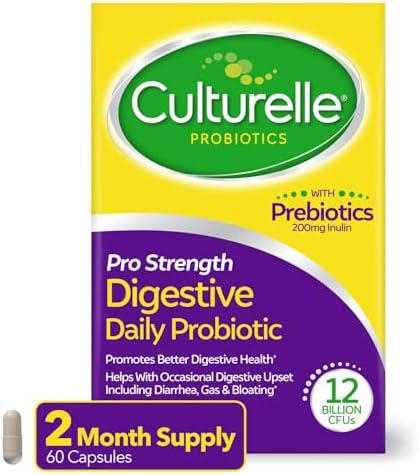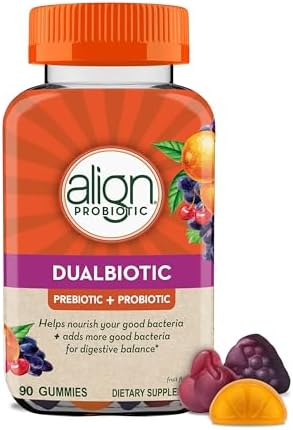Keto and Gut Health: Unlock Microbiome Secrets for Optimal Weight Loss & Boosted Energy
This post may contain affiliate links. If you purchase through these links, I may earn a small commission at no extra cost to you. LEARN MORE.
The ketogenic diet has gained substantial popularity for its ability to promote weight loss and boost energy levels.
By shifting the body’s primary fuel source from carbohydrates to fats, this high-fat, low-carb diet induces a state of ketosis.
While much focus is placed on these immediate benefits, the impact of the ketogenic diet on gut health is often overlooked, yet profoundly significant.
Understanding this relationship can help individuals optimize their microbiome for superior weight loss and energy.

A healthy gut microbiome plays a crucial role in overall well-being, influencing various bodily processes including digestion, immune function, and even mental health.
The dietary choices associated with the ketogenic diet can greatly impact the composition and diversity of gut bacteria.
This interaction offers new pathways to enhance metabolic health and energy efficiency.
Key Takeaways
- Ketogenic diet switches fuel source to fats, enhancing weight loss and energy.
- Gut microbiome health significantly influences metabolic efficiency and wellness.
- Dietary choices on keto can optimize gut health for better results.
Ketogenic Diet Fundamentals

The ketogenic diet emphasizes a high-fat, low-carbohydrate nutrition plan that induces ketosis. This dietary approach aims to promote weight loss and enhance energy levels by leveraging the body’s natural metabolic processes.
Defining Ketosis and Ketone Bodies
Ketosis is a metabolic state where the body utilizes fat as its primary energy source instead of carbohydrates.
This switch occurs when carbohydrate intake is significantly reduced, leading the liver to produce ketone bodies.
These molecules, such as acetoacetate, beta-hydroxybutyrate, and acetone, serve as alternative fuels, replacing glucose in energy production.
The state of ketosis can lead to more stable blood sugar levels and increased energy, as ketones provide a consistent energy source that bypasses glucose fluctuations.
Macronutrient Composition and Keto Diet Variations
The macronutrient composition of a ketogenic diet is crucial.
Typically, this diet consists of 70-90% fats, 10-20% protein, and 5-10% carbohydrates.
Carbohydrate intake is typically restricted to under 50 grams per day.
Variations exist, such as the standard keto diet, cyclical keto, and targeted keto, allowing for some flexibility based on individual needs and goals.
Adequate protein intake is essential to maintain muscle mass while restricting carbohydrates ensures the body remains in ketosis.
A high intake of dietary fibers and healthy fats foundationally supports the diet’s efficacy.
Health Benefits of Ketogenic Diet
The health benefits of the ketogenic diet extend beyond weight loss.
This diet may aid in controlling insulin levels, offering potential benefits for individuals with type 2 diabetes.
Additionally, the diet may enhance mental clarity and focus, as ketones are efficiently used by the brain.
Short-chain fatty acids (SCFAs), byproducts of fiber digestion, support gut health and the proliferation of beneficial bacteria.
While the focus is often on weight loss, improved energy levels and potential neuroprotective benefits are equally notable.
However, due care must be taken to ensure a balanced diet rich in fibers to maintain gut health.
Want to start your keto journey? Read our guide on Free Keto Meal Plan for Beginners for easy recipes and tips to start your keto journey.
Understanding the Gut Microbiome

The gut microbiome is a complex community consisting of trillions of microorganisms, including bacteria, fungi, and viruses.
These microorganisms play a critical role in digestion, immune system regulation, and overall health.
The composition of this microbiome, influenced by diet and other factors, significantly affects metabolic processes and nutrient absorption.
Composition of Gut Microbiota
The gut microbiota is mainly composed of bacteria from two groups: Firmicutes and Bacteroidetes.
These communities are dynamic and influenced by genetics, diet, age, and environment.
Together, they aid in breaking down complex carbohydrates and synthesizing essential vitamins.
Each person’s microbial composition is unique, often referred to as their “microbial fingerprint,” impacting health and disease outcomes.
Roles of Bifidobacteria and Bacteroidetes in the Gut
Bifidobacteria and Bacteroidetes are crucial components of the gut microbiome.
Bifidobacteria are often beneficial, contributing to the production of short-chain fatty acids and maintaining gut barrier integrity. They also help in inhibiting the growth of harmful bacteria.
Bacteroidetes specialize in breaking down complex carbohydrates, aiding in calorie extraction and energy regulation.
Imbalances between these groups can lead to conditions like obesity and inflammatory diseases.
Impact of Diet on Microbial Diversity
Diet plays a vital role in shaping the diversity of the gut microbiome.
A diet rich in prebiotics and probiotics supports microbial balance and proliferation.
Prebiotics, such as dietary fibers, fuel beneficial bacteria growth.
Probiotics, found in fermented foods, introduce beneficial bacteria into the gut.
High-fat, low-carbohydrate diets can reduce microbial diversity, which may interfere with metabolic balance and energy levels.
The Intersection of Keto and Gut Health

Exploring the relationship between keto and gut health reveals varying impacts on gut microflora, inflammation, and potential therapeutic uses.
Effects of a Ketogenic Diet on Gut Microflora
A ketogenic diet significantly alters the composition of gut microflora.
This high-fat, low-carbohydrate approach often leads to a reduction in the diversity of gut bacteria.
Reduced carbohydrate intake can result in lowered levels of beneficial bacteria that thrive on fiber. However, the presence of ketone bodies might support some beneficial microbial species.
The adjustment in gut microflora can also impact digestion and nutrient absorption.
Some studies suggest potential implications for health conditions such as obesity and diabetes.
Balancing fiber intake is crucial to maintain a healthy gut environment while following a ketogenic regimen. Achieving this balance can mitigate negative effects and promote overall gut health.
Keto, Short-Chain Fatty Acids, and Inflammation
Short-chain fatty acids (SCFAs) play a vital role in gut health. They are primarily produced by the fermentation of dietary fibers.
However, on a ketogenic diet, fiber intake is usually reduced, leading to lower SCFA production.
SCFAs are known to support anti-inflammatory processes within the gut.
While a ketogenic diet might decrease SCFA levels, it can have other effects related to inflammation.
The reduction of carbohydrates and focus on healthy fats can potentially limit gut inflammation, aiding in the management of inflammatory conditions.
Close attention to dietary composition is essential to harness these benefits effectively.
Ketogenic Diet as a Therapeutic Approach
The ketogenic diet has gained recognition as a therapeutic approach, particularly for conditions like epilepsy and obesity.
Its impact on gut health is tied to its potential to reduce seizures and assist in weight management.
By altering the energy source of the body, the diet affects gut-brain communication along the gut-brain axis.
Ketosis and the associated metabolic state can contribute to improved glucose control, which is particularly beneficial for individuals with diabetes.
Embracing a ketogenic lifestyle requires careful planning, particularly regarding gut health, as it might interact with other treatments and dietary needs.
Proper management ensures that therapeutic goals are achieved while maintaining gut integrity.
Dietary Choices and Their Impact on Gut Microbiota

Dietary choices significantly shape the composition and activity of gut microbiota. This section explores how carbohydrates, fibers, and specific foods prevalent in ketogenic diets affect gut health and microbiome diversity.
Influence of Carbohydrates and Fibers
Carbohydrates and fibers play a pivotal role in maintaining a healthy gut microbiota.
Digestible carbohydrates are typically limited in a ketogenic diet, directing attention towards fibers to support gut health.
Dietary fiber and resistant starch serve as food for beneficial gut bacteria, enhancing their growth and activity.
High fiber intake from leafy greens and non-starchy vegetables promotes a diverse and resilient gut microbiome. These fibers boost the production of short-chain fatty acids (SCFAs), which are key for gut health and inflammation control.
Probiotic and Prebiotic Foods in Keto
In a ketogenic diet, including both probiotic and prebiotic foods is crucial for optimizing gut health.
Probiotic-rich foods like fermented vegetables can bolster the number of beneficial bacteria. These foods support not just digestion but also the immune system.
Prebiotic foods, such as those containing resistant starch, provide fuel for these good bacteria.
While the keto diet limits certain starches due to their carb content, small amounts of foods like asparagus and garlic can contribute to gut flora diversity without compromising carb limits.
Check out best seller prebiotic and probiotic in Amazon below
Aligning Keto With Fiber-Rich Nutrients
Despite its high-fat focus, the ketogenic diet can be aligned with fiber-rich nutrients to support gut health.
Non-starchy vegetables such as spinach and kale are excellent choices, providing necessary fiber without disrupting ketosis.
Avocado stands out due to its high fiber and healthy fat content.
Incorporating these elements ensures the gut receives enough fiber to encourage a beneficial microbiome balance. Focusing on these foods helps prevent a decrease in microbiome diversity sometimes associated with low-carb diets, maintaining overall gut health.
Read more about keto diet vegetables, discover the top low carb choice for your keto diet.
Navigating Challenges and Maximizing Results

Transitioning to a ketogenic diet can present unique challenges related to gut health, weight management, energy levels, and overall human health. Understanding these challenges and knowing what actions to take can enhance both short-term and long-term benefits.
Managing Ketogenic Diet Transition Phases
Adapting to a ketogenic diet often includes experiencing the “keto flu,” a temporary set of symptoms such as fatigue and digestive discomfort. These symptoms are typically a result of the body adjusting to a significant decrease in carbohydrates.
To ease this transition, individuals can gradually reduce carbohydrate intake instead of making sudden changes.
Increasing water and electrolyte intake, such as sodium, potassium, and magnesium, can help mitigate symptoms.
It’s important to monitor one’s body responses closely and adjust the diet as needed.
Long-Term Keto and Gut Health Considerations
While the ketogenic diet can lead to significant weight loss and improved mental clarity, its long-term effects on gut health require careful consideration.
Prolonged low carbohydrate intake may lead to changes in gut microbiota composition, potentially impacting digestive health and nutrient absorption.
Maintaining a balance of gut-friendly foods like fermented products and prebiotic fibers is crucial. These can help support a diverse microbiome.
Regular check-ins with healthcare professionals can ensure that any changes in gut health are identified early and addressed properly.
Hydration and Digestive Health on Keto
Hydration is essential for maintaining optimal digestive health, particularly on a ketogenic diet where fluid excretion may increase.
Dehydration can exacerbate common digestive issues such as constipation, which might arise due to lower fiber intake from reduced carbohydrates.
It’s important to drink adequate amounts of water throughout the day.
Including electrolytes in the diet helps retain hydration and promotes better digestion. This ensures smoother digestion and supports overall health while pursuing weight management goals.
Practical Tips for Optimizing Gut Health on Keto
Balancing gut health while on a keto diet involves integrating certain practices into daily routines.
Firstly, adding fermented foods like yogurt, kefir, and sauerkraut can boost probiotic intake.
Secondly, incorporating high-fiber vegetables, albeit in moderation, helps maintain regular bowel movements.
Thirdly, managing stress through mindfulness techniques can positively influence gut health, as stress has been known to impact digestion.
Monitoring changes and staying informed with reliable health resources enables individuals to maximize the benefits of keto without compromising gut health.
Click button below to optimize Your Keto Journey with a Custom Meal Plan!
Frequently Asked Questions
The interplay between the ketogenic diet and gut health involves various factors, including microbiome diversity, energy levels, and dietary choices. Addressing these aspects can offer insights into optimizing health and achieving better weight loss outcomes.
How does a ketogenic diet affect the diversity of the gut microbiome?
The ketogenic diet, high in fats and low in carbohydrates, can lead to shifts in gut microbiota composition.
Some studies suggest this diet may reduce microbial diversity due to limited carbohydrate sources that feed beneficial gut bacteria. However, it’s crucial to monitor changes and adjust dietary choices to maintain a balanced microbiome.
What are the potential benefits of keto for gut health and weight loss?
A ketogenic diet can enhance weight loss by promoting fat burning and reducing appetite.
For gut health, it may help alleviate inflammation by reducing carbohydrate intake, thereby potentially improving conditions associated with metabolic health. These benefits can support a healthier microbiome and contribute to overall well-being.
Can a keto diet negatively impact gut health, and if so, how?
Potential drawbacks include a reduction in microbial diversity, as the diet limits carbohydrate-rich foods that are prebiotic for beneficial bacteria.
Additionally, rapid shifts in dietary composition might trigger digestive upset or nutrient deficiencies if not properly managed. Careful planning can mitigate these effects and support gut health.
Which foods are recommended on a keto diet to support a healthy gut microbiome?
Incorporating fiber-rich, low-carbohydrate vegetables such as leafy greens, broccoli, and cauliflower can support gut health.
Fermented foods like sauerkraut and kimchi provide probiotics, while nuts and seeds offer fiber and healthy fats. These choices can help maintain a balanced microbiome within the constraints of a ketogenic diet.
What is the connection between energy levels and the gut microbiome on a keto diet?
The gut microbiome can influence energy levels by modulating the digestion and absorption of nutrients.
On a ketogenic diet, stable blood sugar levels and the use of ketones for fuel may enhance energy stability. A balanced gut microbiome may further support this process by optimizing the utilization of nutritional resources.
How long does it typically take to notice changes in gut health after starting a ketogenic diet?
Changes in gut health can occur within a few weeks of adopting a ketogenic diet.
Individuals might experience shifts in digestion and microbial composition as the body adapts.
Monitoring these changes and making dietary adjustments can help support gut health throughout this transition period.





